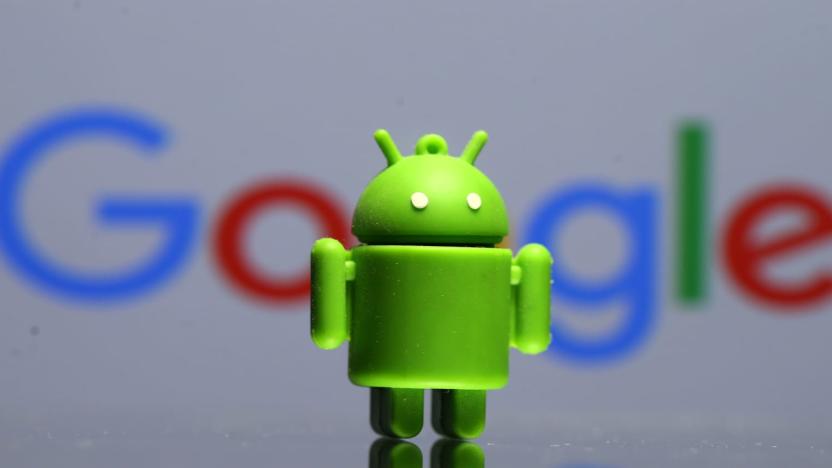java
Latest

Natural Language Programming AIs are taking the drudgery out of coding
Here's how the AI chatbots of tomorrow are shaping the field computer programming today.

IBM's CodeNet dataset can teach AI to translate computer languages
IBM researchers have crafted a Rosetta Stone for programming code.

Google's fight with Oracle will be heard in the Supreme Court
Google is getting one more shot at fending off Oracle's Android copyright claims. The US Supreme Court has agreed to hear Google's appeal of a federal appeals court ruling that Android violated Oracle copyright by using Java code without a license. The appeal will also address a 2014 decision that programing can be copyrighted. A decision is expected by July.

Oracle vs. Google is still a thing, thanks to US federal court
The fight between Oracle and Google has been going on for years, and now there's been a development, according to Bloomberg. The US Court of Appeals found that Google violated Oracle's copyrights through its use of Java code in the Android operating system. The case is now going back to a California federal court to determine how much Alphabet owes Oracle. The Supreme Court has already sent this case back down once, but you can bet that Google will appeal this decision. "We are disappointed the court reversed the jury finding that Java is open and free for everyone," a Google spokesperson told Engadget. "This type of ruling will make apps and online services more expensive for users. We are considering our options." ""The Federal Circuit's opinion upholds fundamental principles of copyright law and makes clear that Google violated the law," an Oracle spokesperson told Engadget. "This decision protects creators and consumers from the unlawful abuse of their rights."

Android doesn't infringe on Oracle copyrights, jury finds
Google emerged victorious in court this afternoon, after a jury found that its use of Java APIs in Android doesn't infringe on Oracle's copyrights. The two companies have been battling it out over the past few years: Oracle originally sued Google back in 2010 because of how Java was integrated into Android. Oracle had a point though, as Google basically lifted entire portions of Sun Microsystem's original Java code for Android. Google, meanwhile, argued that it was free to use the Java code since it was open to developers for many years. Another jury also ruled in Google's favor back in 2012, but a federal court reversed that decision in 2014.

OS X update fixed 'simple' bug that could leak your iMessages
Researchers explained one large security hole in Apple's iMessage app that received a patch last month, but until now we didn't have details on another vulnerability fixed at the same time. By tricking users into clicking a specially-crafted link, hackers could gain access to the usually encrypted communications in OS X El Capitan's Messages. "You don't need a graduate degree in mathematics to exploit it, nor does it require advanced knowledge of memory management, shellcode or ROP chains," according to security researchers at Bishop Fox -- just knowledge of basic JavaScript.

Oracle will soon lay the Java browser plug-in to rest
Now that Chrome, Firefox, Edge and Safari stopped or will soon stop supporting NPAPI web plug-ins*, Oracle thought it best to accept the Java plug-in's fate and let it go. The company has announced that it will be deprecated in the next version of Java to come out on September 22nd before being removed entirely by another future release. In its whitepaper, the company said that the "rise of web usage on mobile device[s]" led browser makers to ditch plug-ins altogether. Mobile browsers don't support them, so they've become a casualty in Google's/Mozilla's/Microsoft's/Apple's plans to offer the same features across platforms.

Android earned Google $22 billion in profit, says Oracle
Who'd have thought that we'd learn just how profitable Android is from Oracle's lawyer during a court proceeding against Google? According to Bloomberg, Oracle Atty. Annette Hurst has revealed that Google's mobile platform generated $31 billion in revenue and a total of $22 billion in profit since it was launched. It brought in that much money mainly from the Google ads shown on Android phones and from Play Store's revenue. "Look at the extraordinary magnitude of commerciality here," Hurst said during the trial.

Google will strip Oracle's Java code out of Android
Google has confirmed that it will no longer use proprietary Java application programming interfaces (APIs) from Oracle in future versions of Android, according to VentureBeat. Instead, it will switch to OpenJDK, an open-source version of Oracle's own Java Development Kit. While you might ask, "Who actually cares?", Google says the change will simplify app development by creating a common codebase for Java. It's hard to imagine that such a huge change (8,902 files are supposedly affected) isn't related to Google's ongoing legal dispute with Oracle, though. That dispute, depending on how it's resolved, could adversely affect Android development and app coding in general.

Oracle settles charges that it misled you on Java security
Oracle's Java software is known for creating its share of headaches, but security is arguably the biggest. For one thing, upgrading to the latest version of Java Standard Edition didn't always remove every old version -- up until last year, it'd leave ancient copies that exposed your PC to attack. And now, Oracle is paying the price. It's settling FTC charges that it "deceived" customers by failing to warn about the security risks behind its Java SE upgrade process. Larry Ellison and crew will have to both warn users about those risks and create tools to remove those older, more vulnerable copies.

Firefox will stop supporting web plugins (except for Flash) by the end of 2016
Horrible browser plugins used to offer extended multimedia features for website, often at the cost of a much worse overall experience -- thankfully, they're going the way of the dodo. Chrome recently banished plugins like Java and Silverlight (and made auto-playing Flash ads disabled by default), and now Firefox is doing the same. Mozilla just announced in a blog post that nearly all old-school plugins will not be supported in Firefox by the end of 2016. That's a long ways away, but it's still good news.

Supreme Court won't touch Google's fight with Oracle over Android
When Oracle got a second chance at making Google pay for using Java programming kits in Android, the folks in Mountain View raced to the Supreme Court in hopes of stopping that renewed lawsuit dead in its tracks. Unfortunately for Google, that's not going to happen -- the Supreme Court now says that it won't tackle the case. The move kicks the issue back to a lower court, and denies a once-and-for-all decision on the extent to which companies can copyright their code. This doesn't necessarily mean that Google will be on the hook for Android, but the company is going to face a tougher fight than it wanted. [Image credit: CSA Images/Getty Images]

Yahoo's trying to trick you into switching search engines
Thinking about how much you'd like to try Yahoo's search engine instead of Google or even Bing? Us neither, but you may end up with it anyway if you're not careful during your next Java update. CEO Marissa Meyer told shareholders yesterday that Yahoo has teamed with Oracle on a new partnership aimed at getting users to take its search for a spin. If you're guessing that means it's "tricking careless users into changing default search engines via a pre-ticked installation box," then ding! That's Oracle's go-to method for installing notorious crapware like the Ask.com toolbar in exchange for, we imagine, considerable sums of money.

'Minecraft' no longer risks opening a big security hole on your PC
As a matter of course, Minecraft has required that you install Java's run-anywhere code base -- a big problem when that tends to introduce security exploits and annoying adware. However, the construction game should be considerably safer thanks to a low-key update in recent weeks. The Windows edition of Minecraft (OS X is coming later this year) now installs a standalone version of Java that's used only while you're playing. If you want, you can scrub the full version of Java without losing access to your blocky masterpieces. And the kicker? If you haven't been keeping on top of your software updates, the game may run smoother at the same time. It's not urgent that you get the upgrade, but it's definitely worth considering if you only bother with Java for the sake of living in Mojang's virtual world.

Oracle's now dumping Java crapware bundles on your Mac, too
Since megayachts aren't going to buy themselves, Larry Ellison's Oracle has been picking up extra cash for years by slipping adware to Windows users via its ubiquitous Java software. If you felt smug because you were on a Mac, guess what! Installing Java on your OSX-equipped MacBook could now lead to an unexpected encounter with the dreaded "Ask.com" toolbar, too. Though not as dangerous as SuperFish, the program will hijack your browser's search functions and delivery iffy, ad-laden results while being tricky for neophytes to remove. If you don't pay attention during installation, you can easily end up with it, as you need to purposefully opt out to avoid it.

Windows' biggest web app framework is coming to Linux and Mac
Microsoft has opened up a lot over the past several months. It released powerful mobile versions of Office, launched cross-platform health technology and even posted some code for .NET, the programming framework that underpins a large part of the Windows world. Today, though, the crew in Redmond is going one step further. It's open-sourcing a much larger web- and server-oriented chunk of the .NET development stack, and has revealed plans to bring an important part of that stack (.NET Core) to both Linux and the Mac in the months ahead. Yes, you read that correctly -- code that Microsoft once held extremely close to the vest will soon run on most modern operating systems.

Google wants to bring its Android copyright battle to the US Supreme Court
Google and Oracle are still arguing over code at the foundation of Google's mobile operating system, Android. Google this week filed a petition with the United States Supreme Court, which appealed a lower court's ruling that Oracle can legally copyright foundational code. The decisions have gone back and forth over the course of the last four years: First a judge in California ruled in favor of Google; then an appeals court ruled in favor of Oracle; and now Google's pushing for the Supreme Court to get involved. But what are the two internet giants even arguing about? At the heart of Android are a set of Java APIs that Oracle is claiming aren't available for commercial use without a licensing fee (approximately $1 billion). Google argues that the API code is functional -- not a "creative work" -- and therefore isn't copyrightable. The case is, of course, far more complex than our explanation, but that's the big picture (our own Chris Velazco goes into far more background detail right here).

Larry Ellison steps aside as Oracle CEO, former HP exec Mark Hurd promoted
Usually the only time we talk about Oracle is in relation to its battle with Google over Java and the use of related APIs in Android, but not today. At the age of 70, co-founder Larry Ellison is stepping down from the post of CEO and moving to a new post as Executive Chairman of the Board and CTO. Taking over the reins of the enterprise software company is the duo of Safra Catz and Mark Hurd. You'll recall Hurd as the former CEO of HP, who resigned from that company over a sexual harassment investigation and false expense reports, and then became the target of an (eventually resolved) lawsuit when he joined Oracle four years ago. His awkward exit resulted in collateral damage to HP acquisition Palm, and by extension webOS. The trio of Ellison, former CFO Catz and Hurd will share responsibilities going forward, with Ellison stating in the press release that the only difference is "Safra and Mark will now report to the Oracle Board rather than to me." [Image credit: NBAE/Getty Images]

Internet Explorer will block old plugins that leave your PC open to attack
Internet Explorer is generally safe for your web browsing needs these days, but that's not necessarily true of the plugins it runs; one old piece of code could leave your PC open to attack. To that end, Microsoft has announced that Internet Explorer 8 through 11 will start blocking outdated ActiveX controls (Internet Explorer-specific add-ons) when an update arrives on August 12th. Much like what you see in Chrome, you'll get a warning if a website wants to use an older plugin. While you can force the obsolete software to run, it won't load automatically until you either upgrade or disable the warnings altogether. IE's blocking will initially focus on ancient versions of Java, the most frequent target of web-based exploits, but it should expand to other plugins over time.

Apple releases new Java update, uninstalls Apple-provided Java applet
Apple has released a new Java update called Java for OS X 2013-005. According to the release notes, the update "delivers improved security, reliability, and compatibility for Java SE 6. Java for OS X 2013-005 supersedes all previous versions of Java for OS X." Of note, however, is another addendum to the update that reveals it will also uninstall older Apple-provided Java applet plug-ins: This update uninstalls the Apple-provided Java applet plug-in from all web browsers. To use applets on a web page, click on the region labeled "Missing plug-in" to go download the latest version of the Java applet plug-in from Oracle. Java has long been a source of OS X security flaws, which is why Apple stopped pre-installing it on new OS X devices. The removal of Apple's older Java applet plug-ins with this latest update shows just how cautious Apple is regarding Java exploits. The update can be downloaded by running Software Update on your Mac. The update is available for Mac OS X v10.6.8, Mac OS X Server v10.6.8, OS X Lion v10.7 or later, OS X Lion Server v10.7 or later and OS X Mountain Lion 10.8 or later.










